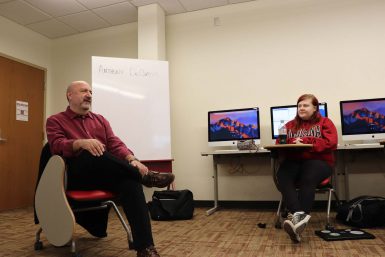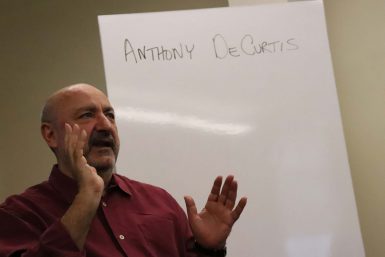Magazine class gets expert advice from Rolling Stone’s Anthony DeCurtis
Anthony DeCurtis, MA’77, PhD’80, has interviewed rock stars like Paul McCartney and Lou Reed, but when he started at Rolling Stone, he had to learn how to report on the job.
He started writing a news column for the front of the magazine, and nobody had ever trained him to do interviews. He’d sit in his office and stare at his telephone when it came time to report.
“OK, I’m going to dial these 10 numbers, and someone’s going to pick up the phone,” he’d think to himself. “They’ll talk to me or they wont talk to me, and in 10 or 15 minutes, this will all be over.”

Now he is a contributing editor at Rolling Stone and a distinguished lecturer in the creative writing program at the University of Pennsylvania. He joined students in MSCH-J481: Creating an Indiana Magazine, taught by senior lecturer Nancy Comiskey, to discuss his career and how he approaches stories authentically. Students in the class are in the middle of reporting on their features for 812: The Magazine of Southern Indiana, an award-winning publication that circulates all across Southern Indiana.
“The class is amazing,” said this issue’s editor-in-chief, junior Sophie Bird. “I think that having the opportunity as a student to not only learn from experienced reporters, but also put together a product that you can hold in your hands afterward, there’s just nothing that compares to that.”
DeCurtis initially went to school to become an English professor. As an IU student, he caught the journalism bug working as the rock critic for the Bloomington Herald-Telephone, where he’d often write concert reviews overnight. In contrast to the writing for academia he was used to, he was able to write about what he was interested in, hand in his copy, see his writing in the newspaper the next day and engage with readers. Writing for academic journals seemed glacial in comparison.
“Something I had to get over very fast was the preciousness of writing. I care about writing. Professionally I care about writing more than pretty much anything,” DeCurtis said. “I believe in really good writing. I think that’s finally what distinguished me.”
His major takeaway from years as a journalist is to never stop reporting. He always writes until he feels he got what he wanted out of the story and there aren’t any gaps. His biggest fear is a reader finding an obvious hole in his story. He told the students to ask themselves what they would want to know as a reader. If they don’t know the answer to that question, he told them to find someone who has the answer.

“What I regard as some of my analytic ability and my critical intelligence was what got me far, and my ability to write. My writing was really strong,” DeCurtis said. “Those things were going to distinguish me. Reporting was something I had to do to validate those things. So the question I was always asking myself was, ‘Is this enough?’”
Because after all, there’s nothing better in DeCurtis’ mind than knowing you have what you need for a story and having a source who tells his authentic story out of honest emotion. There are a lot of distractions in the world, and if a story doesn’t grab someone, she’s gone. Relatable and compelling stories will grab people more than anecdotes that obviously pull for emotion.
“If you have cliche on one hand and contrivance on the other — the pitfalls of writing — I hate contrivance,” DeCurtis said. “I really hate when people are standing on their head trying to get your attention. That should be organic.”
DeCurtis urged the students to write with the same authenticity their sources give them.
“He talked a lot about speaking from the heart and finding sources that are willing to do that and being willing to do that as a reporter,” Bird said. “I feel like he really did that in this class in this talk, so the fact that he was able to talk to us about his experience in a way that was genuine and casual enough that we could relate to was really powerful to me.”
More:

